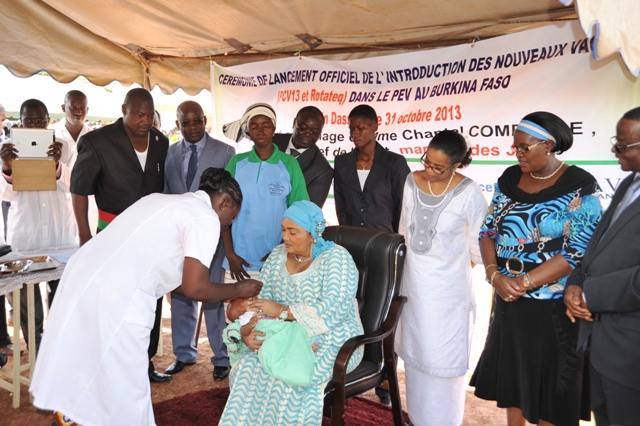“Two long-awaited new vaccines will protect our children in Burkina Faso from pneumonia and diarrhea”
|

Madame Chantal Compaoré, First Lady of Burkina Faso, holds the baby given the first dose of rotavirus vaccine at the official launch ceremony of pneumococcal and rotavirus vaccines, which took place in the rural community of Tanghin Dassouri.
October 31st was a big day for my country, Burkina Faso, because finally introduced vaccines against rotavirus and pneumococcal disease in our routine vaccination program! Thanks to these new vaccines, we will be able to save thousands of children's lives.
As a pediatrician, not a single day goes by where I do not see children suffering from vaccine-preventable diseases, and specifically from pneumonia or diarrhea. Currently, thousands of children less than five years die each year from pneumonia and diarrhea in Burkina Faso, as well as in most countries in sub-Saharan Africa. In 2010, 21,764 child deaths were caused by pneumonia and 14,648 were caused by diarrhea in Burkina Faso. Today we know that prevention through vaccination is the most effective way to guard against these diseases.
As President of the Burkina Faso Pediatric Society (SO.B.PED), I would like to congratulate my Government on this major advancement that allows us to fight these two diseases, which are the most deadly among our children less than five years, and a true blight in our country. By introducing these vaccines together, Burkina Faso is taking a step forward in promoting the approach of the Integrated Global Action Plan for the Prevention and Control of Pneumonia and Diarrhea (GAPPD), which advocates for the introduction of both vaccines as part of a comprehensive and integrated strategy to combat these two diseases.
I rejoice that my country has finally introduced these long-awaited vaccines. Burkina Faso has just joined several other countries in the sub region that have already introduced these two vaccines, thanks to the support of the GAVI Alliance. Globally, 17 of the 48 countries that have introduced rotavirus vaccines into their national immunization programs, and 33 of the 72 countries that have introduced pneumococcal vaccines into their national immunization programs have done so with GAVI support. 18 other countries—17 in Africa—have been approved by GAVI for rotavirus vaccines support and another 18 countries—9 in Africa—have been approved for pneumococcal vaccines support. We sincerely hope that donors will continue to support the GAVI Alliance so that we can continue to benefit from their support for the introduction of new vaccines in our country as well as reduce the deaths caused by these vaccine-preventable diseases.
The Burkina Faso Pediatric Society (SO.B.PED) has been waiting for many years for this new victory for our children's survival. Blowing out its 24th candle this year, the SO.B.PED is one of the oldest academic societies of Burkina Faso. It was founded in 1989 by ten pediatricians and now has over 70 active members scattered in 45 provinces. One of the first objectives mentioned in the statutes of our Society is to support the development of maternal and child health policies at national and regional levels. It is in this frame that we focus our advocacy efforts towards the introduction of new vaccines against the most deadly childhood diseases. When the Haemophilus influenza b vaccine was introduced in the routine immunization program in 2006, SO.B.PED leveraged this opportunity to multiply advocacy efforts towards decision-makers and partners. We did this during World Pneumonia Day in December 2010, and again at the UNAPSA Pan African Pediatric Congress in December 2011 in Ouagadougou. Today, our advocacy efforts are finally paying off!
SO.B.PED gathers for World Pneumonia Day
We must thank not only our leaders but also our numerous partners, donor countries and other donors, and especially the GAVI Alliance and its financial support, without which none of this would have been possible. I would also like to take this opportunity to thank our colleagues at PATH and IVAC/Johns Hopkins University for their assistance and support in our advocacy efforts.
As of October 31, 2013—the “D-Day” of the dual new vaccine launch under the patronage of the First Lady of Burkina Faso—our children will finally be protected against the two biggest killers of children under five: pneumonia and diarrhea. Now, it is up to us to ensure that the introduction and implementation of these vaccines are effective, successful, and sustainable.














